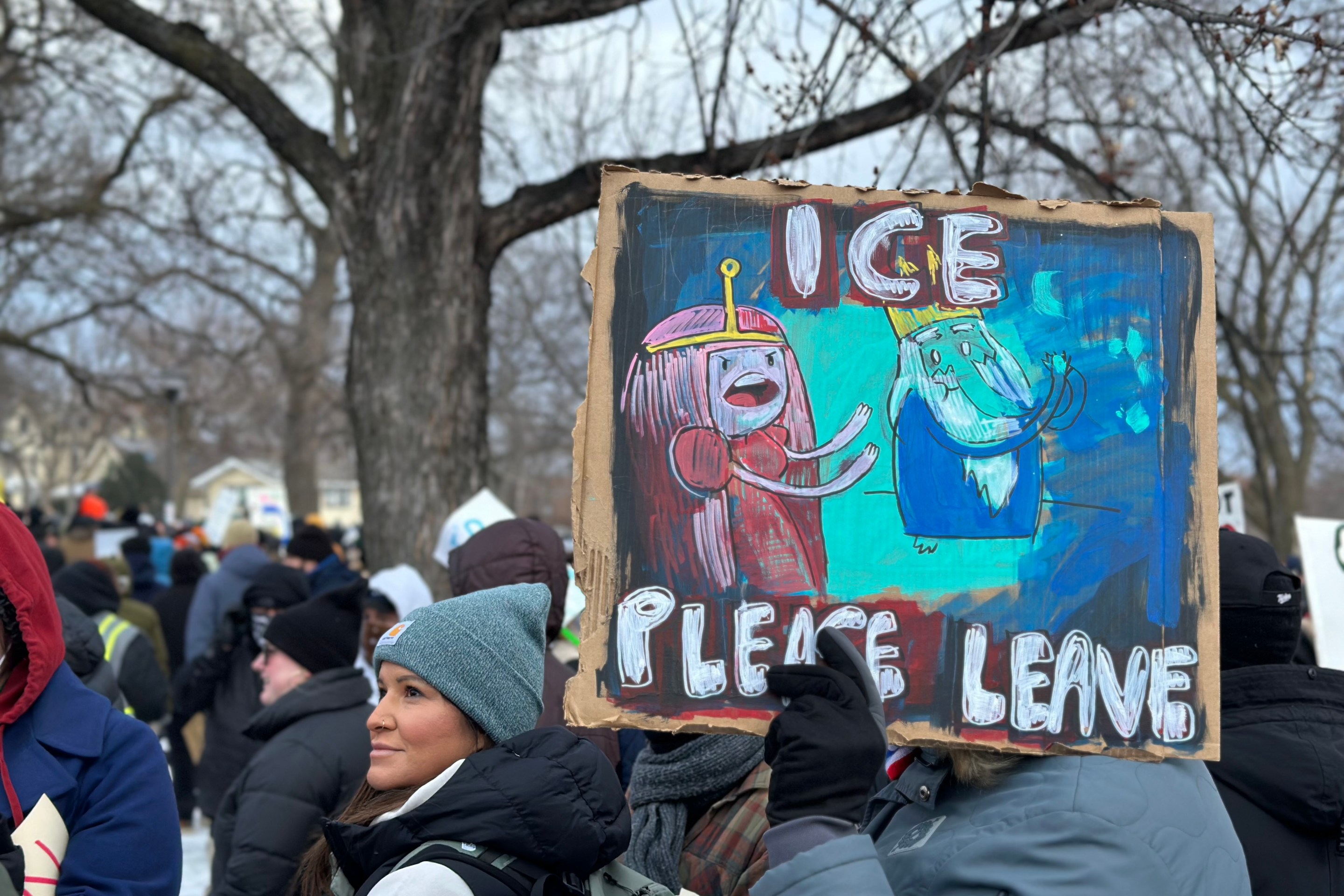Nathaniel Mills is an associate professor of English at the University of Minnesota.
I’m currently preparing to teach the work of Black radical poet June Jordan, an unapologetic and principled advocate of Palestinian liberation, in a course at the University of Minnesota. Re-reading her 1985 poem “The Cedar Trees of Lebanon,” I came across these lines, published in the context of Israel’s horrific 1982 invasion on Lebanon and the IDF-backed Sabra and Shatila massacre of Palestinian refugees: “massacre/remains invisible unless the victim’s/skin reads white.”
This semester, the U of M administration has taken steps to ensure that the massacre of Palestinians in Gaza since 2023—which anyone paying attention to Palestine could see was coming on October 7, 2023—is invisible at the U. The Board of Regents, President Rebecca Cunningham, and Provost Rachel Croson are doing so, apparently, to appease the Trump administration, which is leveraging federal investigations of alleged antisemitism at the U and other schools to basically try to dismantle higher education.
As hundreds of University of Minnesota and community members have acknowledged in an open letter to U administrators, these allegations of antisemitism “are a cynical cover for justifying the dismantling of higher education, and restrictions on free speech for visa and green card holders.” President Cunningham’s response to these allegations (here and here, for example) demonstrates a commitment and urgency from the President’s office that hasn't been mustered for anything else. Cunningham has said little or nothing on Trump’s punitive executive orders or the recent ICE abduction of a U of M student. Rather than standing up to federal harassment and protecting those it targets, the U’s administration appears to have found it easier to capitulate.
The extent to which obedience, anticipatory and otherwise, has been embraced by the administration is a symptom of just how badly U of M leaders, in the face of Trump threats, want to mute support for Palestinian liberation on campus.
How did we get here?
Following those October 7 Hamas attacks against Israel, faculty in three U departments—Gender, Women’s & Sexuality Studies, American Indian Studies, and Cultural Studies & Comparative Literature—issued collectively authored public statements critical of the Israeli state’s conduct toward Palestinians and its obviously imminent (or, depending on when the statement appeared, obviously ongoing) genocidal retaliation in Gaza.
Those statements are protected not only by free speech rights, but by the principle of academic freedom, which holds that faculty experts should be able to make public expressions of the conclusions they draw, as experts, on a given issue. This principle is consistent whether it’s, say, a group of climatology scholars explaining the impacts of global warming; health sciences scholars explaining the benefits of vaccination; gender studies scholars outlining how Palestine is a feminist issue; indigenous studies scholars defining Israel as a settler-colonial state; or history scholars trying to bring further context and complexity to either pro-Palestinian or pro-Israeli advocacy.
These are perspectives deemed competent (but not necessarily “correct”) within the scholars’ field as scholars within that field define it. They thus do not need to be universally or even widely shared by other scholars (in the field or not), or popular with the public, to merit academic freedom protections. And despite plenty of snide intimations otherwise, gender studies, sexuality studies, critical Indigenous studies, and comparative literature are some of the many academic disciplines that incorporate study of Israel and Palestine.
But the three Palestine statements outraged some and prompted demands they be deleted from department websites. Some called the statements antisemitic, others disagreed. Those allegations generally relied on implicit equations of criticism of Israel and/or support for Palestinian liberation with antisemitism, a tendentious definition rather than an objective or widely shared academic standard.
But because these statements on controversial topics provoked controversy and federal attention, the Board of Regents, in an apparent attempt to ensure the genocide in Gaza remained invisible at the U, decided that the days of experts making statements to the public about anything at the U were over.
On March 14, nine of 12 Regents voted to pass a resolution preventing academics of University of Minnesota units (departments, research centers, etc.) from issuing collectively authored statements on any matters of public concern through university channels (unless the university president decides they have “an actual or potential impact on the mission and operations of the University,” a criterion the president apparently also gets to define).
The inanity of the resolution was denounced by hundreds of faculty, staff, and students. A faculty task force had previously created a fair and judicious policy to set guidelines and best practices for academic public statements on current events. That policy, which required disclaimers indicating that faculty statements do not speak for the university itself, was approved near-unanimously by the faculty, staff, and student representatives of the University Senate by a vote of 122-8 on December 5.
But that policy did not make it impossible for scholars to criticize Israel on a University of Minnesota website, which is what the Regents seem to have wanted. Regents Chair Janie Mayeron was frank about this being unacceptable in her comments at the March 14 meeting: “We cannot ignore the reality that the public, whether it is the federal government, our state legislature or donors, is holding the university accountable for the statements and positions by units within the university and is then taking actions against the university that jeopardize its mission.” Her solution? Shutting up: “The university is not, and should not be, in the business of taking positions on these critical and controversial matters of public concern. Individuals can do that. The university, its leaders and units should not.”
But for scholarly experts at the state’s flagship university, “taking positions” and communicating their expert opinions—popular, unilaterally persuasive, or neither—to the public in their U of M capacity is exactly what “critical and controversial” issues require.
As if to one-up the Regents in the tortured logic department, President Cunningham and Provost Rachel Croson then interpreted the board resolution to mean that Cunningham decides if the U itself has an official stance on a given issue: If it doesn’t, then no groups of academics can post statements about it on university websites. A committee of faculty and administrators was then selected to advise Croson on how to censor extant statements. (You’d think it would go without saying that no academic should agree to help suppress their colleagues’ expertise, but here we are.) And on March 29, late on a Saturday afternoon, Croson and her censorship squad abruptly removed multiple statements and other website content about Palestine and pro-Palestinian advocacy (not just the three controversial ones) from U websites. They targeted scholars of ethnic studies and gender and women’s studies: Nearly every department affiliated with the University’s Race, Indigeneity, Disability, Gender, and Sexual Studies Center was censored.
A few days later, likely because they didn’t want to appear to be silencing ethnic studies, women’s studies, and pro-Palestinian expertise too overtly, the administration removed all university website statements supportive of Ukraine following Russia’s invasion (such as this one from the Human Rights Program). All of them had been up for years without objections.
Croson tried to explain that this was because “the university does not currently have a position on the conflict in the Middle East, or the war in the Ukraine.” But “currently” is doing a lot of work there. Until now, the University did have a position on the war in Ukraine. Former President Joan Gabel declared Russia’s assault on Ukraine an “atrocity” and the university divested from Russia in 2022. This collateral censorship shows how far leadership seems willing to go to make sure nothing critical of Israel or supportive of Palestine appears on a U of M website.
I’ve singled out the top two university administrators, but no dean, senior VP, or other administrator with any degree of institutional power at the U has bothered to publicly challenge this censorship. With the exception of the three Regents who forthrightly opposed the March 14 resolution, the leadership and power structure of the university is in lockstep. The dean of the College of Liberal Arts, which houses the censored departments and units, uncritically repeated the provost’s justifications and suggested that such censorship might be excusable as a compromise of “our principles” to “the real impact of our speech on people’s lives and careers.”
Censoring academic statements rankles many at the University of Minnesota in part because it is a misapplication of the kind of bold action that countless members of the U and the community have implored President Cunningham to take to defend us, our rights, and the university. Even bold rhetoric would be welcome in protecting non-citizens, standing against ICE abductions, rejecting false equations of antisemitism with Palestinian liberation, and avowing her support of the rights of pro-Palestinian activists.
Crickets, mostly, until April 7, when Cunningham emailed the U of M community, beginning: “You made it abundantly clear that you want more than words from university leadership. You want decisive action.” Promising start, right?
Did she announce new steps to protect non-citizens at the U from kidnappings and deportations? To protect the right to advocate against genocide in Gaza? To defend academic freedom? How about telling the community that she joined the President’s Alliance on Higher Education and Immigration? (Rumor is she has, but it’s not public anywhere.) Or that she was joining a major national lawsuit challenging Trump’s use of deportation to silence campus speech? Multiple Minnesota colleges joined, but not the U.
No. The only public decisive and bold actions she’s taken are ones that comply with the administration’s demand to root out alleged “antisemitism” with measures that will likely mean stigmatizing and silencing advocacy for Palestinians and opposition to the ongoing genocide. Following earlier announcements that the U will partner with Hillel’s Campus Climate Initiative—which local progressive groups, including Jewish Voice for Peace, Educators for Justice in Palestine, and Tzedek-UMN, recently described as “a Trojan Horse to criminalize Palestine liberation activism on campus”—she announced that there will be mandated employee training on antisemitic bias. (See how that announcement went over with U of M Redditors.) Scholar Eli Mayerhoff has pointed out that such training at other institutions “indoctrinates participants into the political project of Zionism.” There’s little reason to suspect it’ll be different here.
If you read Cunningham’s email closely, you might notice that as an afterthought, she announces that down the line somewhere there might be training in other forms of bias like, say, Islamophobia.
The U’s slogan is “Driven to Discover,” with the de facto caveat, now, that its employees and students preferably not discover—and certainly not make statements about—the genocide in Gaza or the urgency of Palestinian liberation.







